Shanghai Vice Mayor Zhou Bo (周波) expressed his willingness to forge cooperation with more cities and counties in Taiwan — provided that they have an “accurate perception” of the nature of cross-strait relations — as he touted the achievements of the annual Taipei-Shanghai Forum that opened in Taipei yesterday morning.
This year’s forum was themed “sustainable cities, sustainable development,” with a special focus on a circular economy. Other topics discussed at the event included public housing; urban renewal; healthcare; movie and fashion culture; and waste disposal and repurposing.
“As long as they have an accurate perception about cross-strait ties and exchanges, we are willing to begin cooperation with more of Taiwan’s cities and counties,” Zhou said when asked why China has been willing to interact with Taipei Mayor Ko Wen-je (柯文哲), even though he has only endorsed the idea that “both sides of the [Taiwan] Strait are one family” and not the so-called “1992 consensus.”
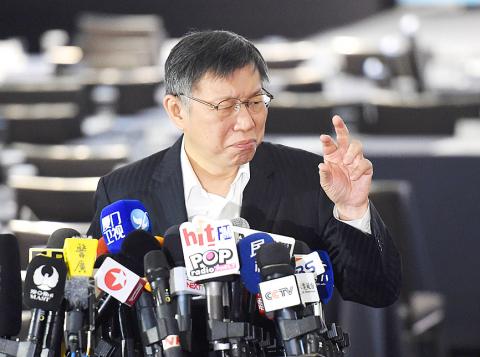
Photo: Huang Yao-cheng, Taipei Times
Ko has had a clear and consistent perception of cross-strait relations, which Zhou said is “highly conducive” to enhancing cooperation and exchanges across the Taiwan Strait.”
“We believe adherence to the idea of ‘both sides of the Strait are one family’ will allow cooperation between Shanghai and Taipei to be further expanded,” he said.
Zhou made the remarks at a news conference after the opening ceremony of the forum, which was held at the Regent Taipei hotel and was attended by 135 representatives from Shanghai and 250 representatives from Taipei.
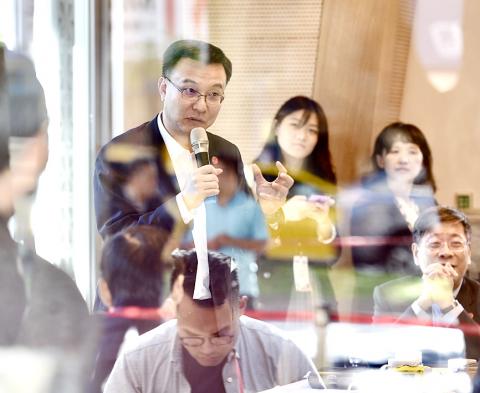
Photo: Peter Lo, Taipei Times
The “1992 consensus” refers to a tacit understanding between the Chinese Nationalist Party (KMT) and the Chinese Communist Party that both sides acknowledge there is “one China,” with each side having its own interpretation of what “China” means.
Former Mainland Affairs Council minister Su Chi (蘇起) in 2006 admitted to making up the term in 2000.
China’s Taiwan Affairs Office has made acknowledgement of the “1992 consensus” a prerequisite for cross-strait exchanges, but some politicians, including Ko, have chosen to meet Beijing’s demand halfway by supporting the “one family” idea.
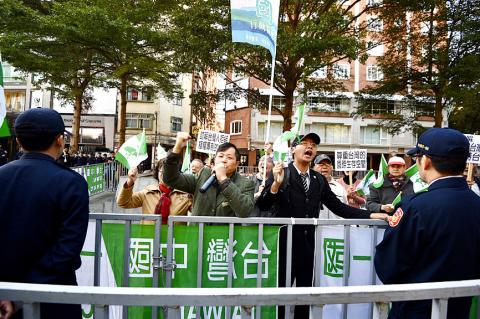
Photo: Peter Lo, Taipei Times
Zhou also embraced the idea of expanding the forum, now in its ninth year, to include Kaohsiung, but said how a three-city forum could work is an issue that needs to be discussed by all concerned parties.
There has been speculation that closer exchanges would be seen between Kaohsiung and Chinese cities after Kaohsiung mayor-elect Han Kuo-yu (韓國瑜) — who is to be the city’s first KMT mayor in 20 years and who has publicly endorsed the “1992 consensus” — takes office on Tuesday.
At his news conference, Ko defended his decision to use “both sides of the Strait are one family” again at a dinner the Taipei City Government threw for Zhou’s delegation on Wednesday, despite previously lamenting the “stigmatization” of the phrase, as well as the term “1992 consensus.”
"I used that phrase in 2015 and last year. Like I said at the very beginning, we should avoid throwing a wild card and should just stick to old practices,” Ko said, adding that his approach is to find an option acceptable to most people, as it is impossible to find one that satisfies everyone in a democracy.
However, Ko, who was re-elected in the Nov. 24 nine-in-one elections, revealed that he has suggested to Beijing that efforts should be made to develop a new term that both sides find tolerable to replace the “1992 consensus” and the “one family” idea.
Given that both terms have been given a political label, neither can now be used without upsetting some people, he said.
At the event’s main session, Zhou said that Shanghai has benefited tremendously from the annual forum and has put into practice the lessons it learned from Taipei, including the establishment of a service hotline for residents.
Taipei Deputy Mayor Teng Chia-chi (鄧家基) said he hopes that the forum can help overcome the differences between the two cities and pave the way for the peaceful development of cross-strait relations.
“What we have observed since last month’s elections is that the pan-blue, pan-green and pan-white camps have all agreed on the importance of expanded interactions. Hopefully, Taipei’s and Shanghai’s positive interactions could be a catalyst for more comprehensive exchanges across the Taiwan Strait,” he said.
Three memorandums of understanding were inked at the forum: one for the cultivation of young athletes in Taipei and Shanghai; one for exchanges between Taipei’s Datong District (大同) and Shanghai’s Jiading District; and one for cooperation between the Taipei Film Commission and the Shanghai Broadcasting Film and Television Producers Association.

Taiwan’s Lee Chia-hao (李佳豪) on Sunday won a silver medal at the All England Open Badminton Championships in Birmingham, England, a career best. Lee, 25, took silver in the final of the men’s singles against world No. 1 Shi Yuqi (石宇奇) of China, who won 21-17, 21-19 in a tough match that lasted 51 minutes. After the match, the Taiwanese player, who ranks No. 22 in the world, said it felt unreal to be challenging an opponent of Shi’s caliber. “I had to be in peak form, and constantly switch my rhythm and tactics in order to score points effectively,” he said. Lee got
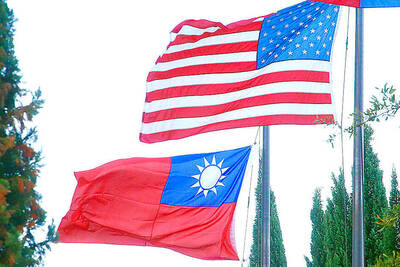
EMBRACING TAIWAN: US lawmakers have introduced an act aiming to replace the use of ‘Chinese Taipei’ with ‘Taiwan’ across all Washington’s federal agencies A group of US House of Representatives lawmakers has introduced legislation to replace the term “Chinese Taipei” with “Taiwan” across all federal agencies. US Representative Byron Donalds announced the introduction of the “America supports Taiwan act,” which would mandate federal agencies adopt “Taiwan” in place of “Chinese Taipei,” a news release on his page on the US House of Representatives’ Web site said. US representatives Mike Collins, Barry Moore and Tom Tiffany are cosponsors of the legislation, US political newspaper The Hill reported yesterday. “The legislation is a push to normalize the position of Taiwan as an autonomous country, although the official US
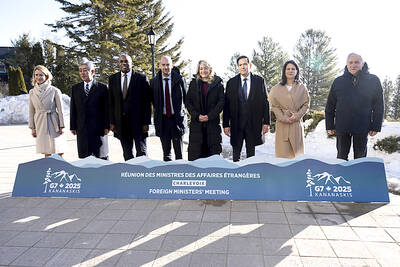
CHANGE OF TONE: G7 foreign ministers dropped past reassurances that there is no change in the position of the G7 members on Taiwan, including ‘one China’ policies G7 foreign ministers on Friday took a tough stance on China, stepping up their language on Taiwan and omitting some conciliatory references from past statements, including to “one China” policies. A statement by ministers meeting in Canada mirrored last month’s Japan-US statement in condemning “coercion” toward Taiwan. Compared with a G7 foreign ministers’ statement in November last year, the statement added members’ concerns over China’s nuclear buildup, although it omitted references to their concerns about Beijing’s human rights abuses in Xinjiang, Tibet and Hong Kong. Also missing were references stressing the desire for “constructive and stable relations with China” and
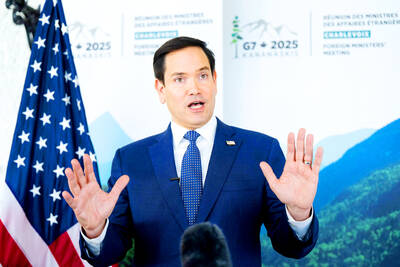
‘CROWN JEWEL’: Washington ‘can delay and deter’ Chinese President Xi Jinping’s plans for Taiwan, but it is ‘a very delicate situation there,’ the secretary of state said US President Donald Trump is opposed to any change to Taiwan’s “status quo” by force or extortion and would maintain that policy, US Secretary of State Marco Rubio told the Hugh Hewitt Show host on Wednesday. The US’ policy is to maintain Taiwan’s “status quo” and to oppose any changes in the situation by force or extortion, Rubio said. Hewitt asked Rubio about the significance of Trump earlier this month speaking with Taiwan Semiconductor Manufacturing Co (台積電) chairman C.C. Wei (魏哲家) at the White House, a meeting that Hewitt described as a “big deal.” Asked whether the meeting was an indication of the